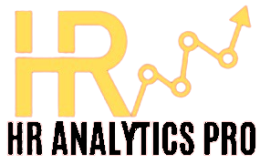The Power of HR Analytics: A Game-Changer for HR Professionals
July 24, 2023 2024-01-14 11:09The Power of HR Analytics: A Game-Changer for HR Professionals
The Power of HR Analytics: A Game-Changer for HR Professionals
The Power of HR Analytics
In the rapidly evolving world of human resources, data-driven decision-making has become the cornerstone of success. HR analytics, the process of leveraging data to gain valuable insights into employee behavior and organizational performance, has emerged as a crucial tool for HR professionals. Gone are the days of relying solely on intuition and gut feelings; HR analytics empowers professionals to make well-informed, strategic decisions that drive business growth, improve employee satisfaction, and optimize overall productivity.
In this article, we will delve into the significance of HR analytics and explore how it transforms the way HR professionals tackle complex challenges.
1. Understanding HR Analytics
HR analytics involves collecting, analyzing, and interpreting employee-related data to make evidence-based decisions. The data encompasses various aspects, such as employee demographics, performance metrics, turnover rates, recruitment channels, and engagement levels. By utilizing advanced analytical techniques, HR professionals can draw meaningful conclusions and identify patterns and trends that might otherwise go unnoticed.
2. Identifying and Attracting Top Talent
In today’s competitive job market, attracting and retaining top talent is a key challenge for HR professionals. With HR analytics, organizations can gain a comprehensive understanding of what characteristics, qualifications, and experiences are common among their most successful employees. By using this data, HR professionals can create targeted recruitment strategies that attract candidates who are more likely to excel in their roles. Additionally, analytics can help optimize job postings, leading to a more efficient and effective hiring process.
3. Enhancing Employee Engagement and Satisfaction
Engaged and satisfied employees are the backbone of any successful organization. HR analytics plays a crucial role in measuring and improving employee engagement. Through sentiment analysis, surveys, and feedback data, HR professionals can pinpoint the factors that drive or hinder employee satisfaction. Armed with this knowledge, they can implement targeted initiatives, such as personalized training and development programs or wellness initiatives, to boost employee morale and productivity.
4. Predictive Analytics for Employee Retention
High employee turnover can be costly and disruptive for any organization. However, HR analytics can aid in predicting potential turnover risks. By analyzing historical data and key indicators like performance reviews, employee feedback, and attendance records, HR professionals can identify early warning signs of dissatisfaction and take proactive steps to address issues before they escalate. Predictive analytics empowers HR teams to design effective retention strategies and maintain a stable and motivated workforce.
5. Optimizing Performance Management
Performance management is a fundamental aspect of HR operations. HR analytics allows professionals to assess individual and team performance objectively. By evaluating performance metrics, identifying skill gaps, and determining training needs, HR professionals can create targeted development plans that nurture talent and improve overall productivity. Additionally, analytics can be used to identify high-performing employees who deserve recognition and rewards, fostering a culture of appreciation and motivation.
6. Improving Organizational Decision-Making
With data-driven insights at their disposal, HR professionals can contribute significantly to strategic decision-making at the organizational level. Whether it’s developing workforce planning strategies, determining compensation packages, or assessing the impact of new policies, HR analytics provides valuable information that supports leaders in making well-informed choices that align with business goals.
Conclusion:
As HR professionals navigate the dynamic landscape of human resources, embracing HR analytics has become non-negotiable. From attracting top talent to enhancing employee engagement and optimizing performance management, data-driven decision-making has the power to revolutionize HR practices. Embracing this transformative technology enables HR professionals to take on a more strategic role within the organization, driving growth and cultivating a culture of continuous improvement. The future of HR lies in its ability to harness the power of data, and those who seize this opportunity will undoubtedly lead their organizations to greater success.
Search
Categories
Latest Posts
Learning Development HR Trends 2024
March 15, 2024Job Design Methods
March 15, 2024Popular Tags






